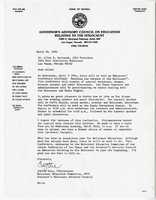Search the Special Collections and Archives Portal
Search Results

Transcript of roundtable interview about Kristallnacht with Esther Finder, Raymonde Fiol, Alexander Kuechel, Philipp Meinecke and Rabbi Felipe Goodman, by Barbara Tabach, March 17, 2015
Date
Archival Collection
Description
In this interview, the participants discuss their experiences during Kristallnacht, and the commemoration events in southern Nevada with Holocaust survivors and their families. Mr. Kuechel recounts his journey through concentration camps and being liberated by the Russians. Rabbi Goodman talks about meeting Mr. Meinecke, whose grandfather was a high-ranking SS officer. Meinecke discusses his upbringing in Germany and trying to learn about his family's involvement in the Holocaust, and the hope he felt after the fall of the Berlin Wall as Jews returned to Germany. The group discusses the importance of Holocaust education because there are still so many untold stories.
On November 9th to November 10th, 1938, in an incident known as Kristallnacht, Nazis in Germany torched synagogues, vandalized Jewish homes, schools and businesses, and killed close to one hundred Jews. In the aftermath of Kristallnacht, also called the Night of Broken Glass, some thirty thousand Jewish men were arrested and sent to Nazi concentration camps. German Jews had been subjected to repressive policies since 1933 when Nazi Party leader Adolph Hitler became chancellor of Germany. However, prior to Kristallnacht these Nazi policies had been primarily nonviolent. However, after Kristallnacht conditions for German Jews grew increasingly worse. During World War II, Hitler and the Nazis implemented their so-called final solution to what they referred to as "the Jewish problem" and carried out the systematic murder of some six million European Jews in what is now commonly known as the Holocaust.
Text

Meeting Minutes from the Jewish Federation of Las Vegas Holocaust Education Committee Educators' Conference Subcommittee, March 22, 1994
Date
Archival Collection
Description
Meeting Minutes from the Jewish Federation of Las Vegas Holocaust Education Committee Educators' Conference Subcommittee.
Text

Letter to Dr. Allan N. Boruszak from Edythe Katz, March 29, 1994
Date
Archival Collection
Description
Letter from Edythe Katz, Chairperson of the Holocaust Education Committee, Jewish Federation of Las Vegas, Governor's Holocaust Advisory Council to Allan Boruszak inviting him to join the Educators Conference: "Teaching Lessons on the Holocaust."
Text

List of past presidents of the Jewish Federation of Las Vegas, 2015
Date
Archival Collection
Description
The list includes the past presidents and chairs of the Jewish Federation of Las Vegas, the Women's Division leadership, and the Jewish Emerging Leaders chairs.
Text
Audio clip from interview with Harry Sax, April 8, 2015
Date
Archival Collection
Description
Part of an interview with Harry Sax on April 8, 2015. In this clip, Sax talks about bringing the Arby's franchise to Las Vegas in the 1960s after doing market research on the population here. He and his partner realized the correlation between disposable income and access to retail that allowed them to be successful.
Sound
Audio clip from interview with Rabbi Yocheved Mintz, March 11, 2015
Date
Archival Collection
Description
In this audio clip, Rabbi Mintz talks about attending a class at the Academy for Jewish Religion in California, which helped her realize a lifelong dream to become a rabbi.
Sound
Audio clip from interview with Marilyn Glovinsky and Melissa Lemoine, April 2, 2015
Date
Archival Collection
Description
Marilyn Glovinsky talks about growing up Jewish in New York "without thinking about it," and the decision to send her daughter to Hebrew School in Las Vegas.
Sound
Audio clip from interview with Phyllis Friedman, March 2, 2015
Date
Archival Collection
Description
Phyllis Friedman discusses the local productions of "The Laramie Project" play performed at area high schools. She talks about the different reactions from the community to the production, and the involvement of the Anti-Defamation League (ADL).
Sound
Audio clip from interview with Justice Michael Cherry, September 19, 2014
Date
Archival Collection
Description
Part of an interview with Justice Michael Cherry on September 19, 2014. In this interview, Justice Cherry discusses connections with Jewish casino operators. He also talks about losing to, then representing, unions in court proceedings. He was later endorsed by the unions when he ran for office.
Sound
